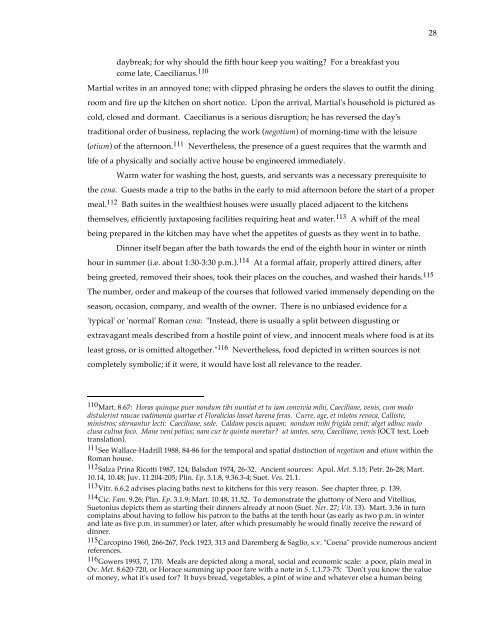KITCHENS AND DINING ROOMS AT POMPEII ... - Get a Free Blog
KITCHENS AND DINING ROOMS AT POMPEII ... - Get a Free Blog
KITCHENS AND DINING ROOMS AT POMPEII ... - Get a Free Blog
Create successful ePaper yourself
Turn your PDF publications into a flip-book with our unique Google optimized e-Paper software.
daybreak; for why should the fifth hour keep you waiting? For a breakfast you<br />
come late, Caecilianus. 110<br />
Martial writes in an annoyed tone; with clipped phrasing he orders the slaves to outfit the dining<br />
room and fire up the kitchen on short notice. Upon the arrival, Martial's household is pictured as<br />
cold, closed and dormant. Caecilianus is a serious disruption; he has reversed the day's<br />
traditional order of business, replacing the work (negotium) of morning-time with the leisure<br />
(otium) of the afternoon. 111 Nevertheless, the presence of a guest requires that the warmth and<br />
life of a physically and socially active house be engineered immediately.<br />
Warm water for washing the host, guests, and servants was a necessary prerequisite to<br />
the cena. Guests made a trip to the baths in the early to mid afternoon before the start of a proper<br />
meal. 112 Bath suites in the wealthiest houses were usually placed adjacent to the kitchens<br />
themselves, efficiently juxtaposing facilities requiring heat and water. 113 A whiff of the meal<br />
being prepared in the kitchen may have whet the appetites of guests as they went in to bathe.<br />
Dinner itself began after the bath towards the end of the eighth hour in winter or ninth<br />
hour in summer (i.e. about 1:30-3:30 p.m.). 114 At a formal affair, properly attired diners, after<br />
being greeted, removed their shoes, took their places on the couches, and washed their hands. 115<br />
The number, order and makeup of the courses that followed varied immensely depending on the<br />
season, occasion, company, and wealth of the owner. There is no unbiased evidence for a<br />
'typical' or 'normal' Roman cena: "Instead, there is usually a split between disgusting or<br />
extravagant meals described from a hostile point of view, and innocent meals where food is at its<br />
least gross, or is omitted altogether." 116 Nevertheless, food depicted in written sources is not<br />
completely symbolic; if it were, it would have lost all relevance to the reader.<br />
110 Mart. 8.67: Horas quinque puer nondum tibi nuntiat et tu iam convivia mihi, Caeciliane, venis, cum modo<br />
distulerint raucae vadimonia quartae et Floralicias lasset harena feras. Curre, age, et inlotos revoca, Calliste,<br />
ministros; sternantur lecti: Caeciliane, sede. Caldam poscis aquam: nondum mihi frigida venit; alget adhuc nudo<br />
clusa culina foco. Mane veni potius; nam cur te quinta moretur? ut iantes, sero, Caeciliane, venis (OCT text, Loeb<br />
translation).<br />
111 See Wallace-Hadrill 1988, 84-86 for the temporal and spatial distinction of negotium and otium within the<br />
Roman house.<br />
112 Salza Prina Ricotti 1987, 124; Balsdon 1974, 26-32. Ancient sources: Apul. Met. 5.15; Petr. 26-28; Mart.<br />
10.14, 10.48; Juv. 11.204-205; Plin. Ep. 3.1.8, 9.36.3-4; Suet. Ves. 21.1.<br />
113 Vitr. 6.6.2 advises placing baths next to kitchens for this very reason. See chapter three, p. 139.<br />
114 Cic. Fam. 9.26; Plin. Ep. 3.1.9; Mart. 10.48, 11.52. To demonstrate the gluttony of Nero and Vitellius,<br />
Suetonius depicts them as starting their dinners already at noon (Suet. Ner. 27; Vit. 13). Mart. 3.36 in turn<br />
complains about having to follow his patron to the baths at the tenth hour (as early as two p.m. in winter<br />
and late as five p.m. in summer) or later, after which presumably he would finally receive the reward of<br />
dinner.<br />
115 Carcopino 1960, 266-267, Peck 1923, 313 and Daremberg & Saglio, s.v. "Coena" provide numerous ancient<br />
references.<br />
116 Gowers 1993, 7, 170. Meals are depicted along a moral, social and economic scale: a poor, plain meal in<br />
Ov. Met. 8.620-720, or Horace summing up poor fare with a note in S. 1.1.73-75: "Don't you know the value<br />
of money, what it's used for? It buys bread, vegetables, a pint of wine and whatever else a human being<br />
28


